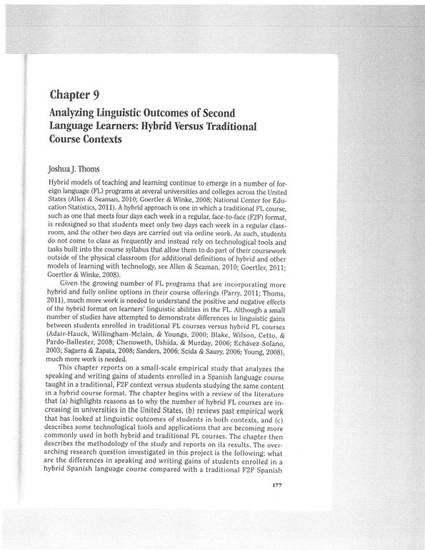
Contribution to Book
Analyzing linguistic outcomes of L2 learners: Hybrid vs. traditional course contexts
Hybrid language teaching and learning: Exploring theoretical, pedagogical and curricular issues
(2013)
Abstract
This chapter reports on a small-scale empirical study that analyzes the speaking and writing gains of students enrolled in an introductory Spanish language course taught in a traditional, face-to-face context and a second, introductory Spanish language course that was delivered via a hybrid course format. Both were college-level courses taught by the same instructor. The overarching research question investigated in this project is the following: what are the differences in speaking and writing gains of students enrolled in each of the two types of courses over the course of an academic semester? Results indicate that there were no statistically significant differences between students in the traditional and hybrid courses with respect to speaking gains. However, there were statistically significant differences regarding writing ability because students in the hybrid course improved more versus students in the traditional course. Reasons for these differences are delineated and future areas of research are offered.
Keywords
- analyzing,
- linguistic,
- L2 learners,
- hybrid,
- traditional,
- course,
- context
Disciplines
Publication Date
January 1, 2013
Editor
Joshua Thoms, Fernando Rubio
Publisher
Heinle Cengage Learning
Citation Information
Analyzing linguistic outcomes of L2 learners: Hybrid vs. traditional course contexts. In F. Rubio & J. Thoms (Eds.), Hybrid language teaching and learning: Exploring theoretical, pedagogical and curricular issues (177–195). Boston: Heinle Cengage.
